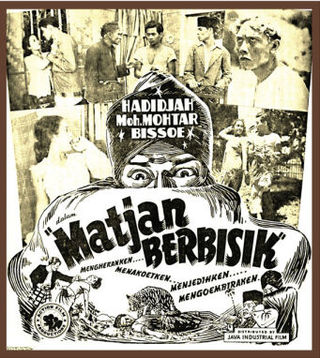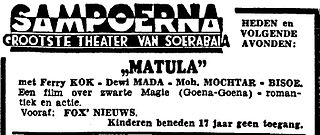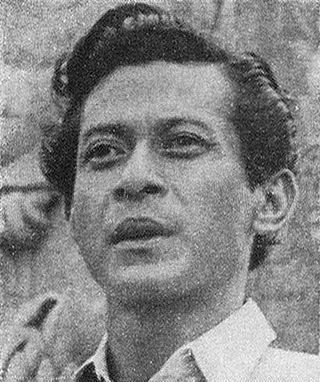Tan Tjoei Hock was an Indonesian journalist and filmmaker. Born in Batavia, he was discovered by The Teng Chun in the late 1930s. Tan became one of the most productive film directors of the Dutch East Indies between 1940 and 1941, directing nine films – primarily action.

Pah Wongso Pendekar Boediman is a 1941 detective film from the Dutch East Indies. The first production by Star Film, it was produced by Jo Eng Sek and features camerawork by Cho' Chin Hsin. Starring Pah Wongso, Elly Joenara and Mohamad Arief, it follows the social worker Pah Wongso as he investigates a murder to clear his protégé's name.

Air Mata Iboe is a 1941 drama film from the Dutch East Indies directed and written by Njoo Cheong Seng. Starring Fifi Young, Rd Ismail, Ali Sarosa, and Ali Joego, it followed a mother who raises her children lovingly but is ultimately betrayed by her eldest sons when she falls upon hard times. The film, billed as a "musical extravaganza," featured a soundtrack by R. Koesbini, and an eponymous title song written by Njoo.

Panggilan Darah is a 1941 film from the Dutch East Indies written and directed by Sutan Usman Karim and produced by Tjho Seng Han for Oriental Film. The black-and-white film starred Dhalia and Soerip as orphaned sisters trying to make a living in the colonial capital of Batavia before moving to Kudus to work at a clove cigarette factory.

Matjan Berbisik is a 1940 film from the Dutch East Indies which was directed by Tan Tjoei Hock and produced by The Teng Chun. Starring Hadidjah and Mohamad Mochtar, the film follows two men who are raised as brothers and compete for the love of the same woman. A copy of the black-and-white film, which featured keroncong music, is stored at Sinematek Indonesia.

Srigala Item is a 1941 film from the Dutch East Indies that was directed by Tan Tjoei Hock and produced by The Teng Chun for Action Film. Starring Hadidjah, Mohamad Mochtar, and Tan Tjeng Bok, the film's plot – inspired by Zorro – follows a young man who became a masked vigilante to take revenge against his conniving uncle. Srigala Item was a commercial success, which Misbach Yusa Biran credits to the plot's use for escapism. A copy of the black-and-white film, which featured kroncong music, is stored at Sinematek Indonesia.
Sorga Palsoe is a 1941 film from the Dutch East Indies which was directed by Tan Tjoei Hock for Java Industrial Film. The tragedy, starring Lo Tjin Nio, Tong Hui, Lim Poen Tjiaw, and Rohana, was a commercial failure. It is likely lost.

Bengawan Solo is a now-lost 1949 film from what is now Indonesia. Directed by Jo An Djan, it starred Sofia WD, Rd Mochtar, and Mohamad Mochtar.

Matula is a 1941 film from the Dutch East Indies which was directed by Tan Tjoei Hock and produced by The Teng Chun of Java Industrial Film. The black-and-white film, now likely lost, follows a young man who tries to give a woman's soul to a shaman as payment for being made handsome.

Mega Mendoeng is a black-and-white drama film from the Dutch East Indies directed by Boen Kin Nam and produced by Ang Hock Liem for Union Films. Starring Rd Soekarno, Oedjang, Boen Sofiati, and Soehaena, it follows two young lovers who are separated by lies but ultimately reunite at the village of Mega Mendoeng in Bogor. This film, Union's seventh and final production, was shot concurrently with Soeara Berbisa and completed over a period of three months. It was released in early 1942 and screened as late as July of that year, but may now be lost.

Dasima is a 1940 film from the Dutch East Indies directed by Tan Tjoei Hock and produced by The Teng Chun. It is the third adaptation of G. Francis' 1896 novel Tjerita Njai Dasima.

Poesaka Terpendam is a 1941 film from the Dutch East Indies produced by Tan's Film and starring Roekiah, Djoemala, and Kartolo.

Hadidjah was an Indonesian film actress best known for partnership with Moh Mochtar in seven films released by Java Industrial Film between 1939 and 1941. She was the mother of Citra Award-winning musician Idris Sardi.

Mohamad Mochtar, usually credited as Moh Mochtar, was an Indonesian film actor active from 1939 until his death in 1981.

Tjioeng Wanara is a 1941 film from the Dutch East Indies directed and produced by Jo Eng Sek. Starring R Sukran, Elly Joenara and AB Djoenaedi, it featured more than 500 people in supporting roles. The film follows a young prince named Tjioeng Wanara who must reclaim his throne from the cruel King of Galuh; it is adapted from the Sundanese legend of the same name.
Singa Laoet is a 1941 film from the Dutch East Indies. Directed by Tan Tjoei Hock and produced by The Teng Chun, it starred Tan Tjen Bok, Mohamad Mochtar, and Hadidjah.

Star Film was a film production company in the Dutch East Indies. Established by Chinese-Indonesian businessman Jo Eng Sek and Chinese cameraman Cho' Chin Hsin in 1940, it produced five black-and-white films in 1940 and 1941; two of these were directed by Jo, and the remainder were directed by Wu Tsun. Another film was under production when the studio was closed following the Japanese occupation of the Dutch East Indies. Star helped establish the careers of actors such as S Waldy and Elly Joenara, and produced screenplays written by Rd Ariffien and Saeroen; its output, however, is probably lost.

Union Films was a film production company located in Batavia, Dutch East Indies. Established by ethnic Chinese businessmen Ang Hock Liem and Tjoa Ma Tjoen in 1940, it produced seven black-and-white films before it was dissolved in 1942; all are thought to be lost. The company's films were directed by four men, mostly ethnic Chinese, and launched the careers of actors such as Rendra Karno and Djoewariah.

Oriental Film was a film production company in Batavia, Dutch East Indies. Established by ethnic Chinese businessman Tjo Seng Han in 1940, it completed four black-and-white films before it was closed in 1941. All the company's films were screened into the 1950s but may now be lost. They were directed by two men, Njoo Cheong Seng and Sutan Usman Karim, and launched the careers of actors such as Dhalia and Soerip.

Pah Wongso Tersangka, also known under the Dutch title Pah Wongso Keert Terug, is a 1941 film from the Dutch East Indies directed by Wu Tsun for Star Film. Saeroen's first work for the company, it is a sequel to the 1940 detective film Pah Wongso Pendekar Boediman, and stars the social worker L. V. Wijnhamer, Jr as a man who comes under suspicion and must clear his name. This possibly-lost film was styled as a comedy.

















